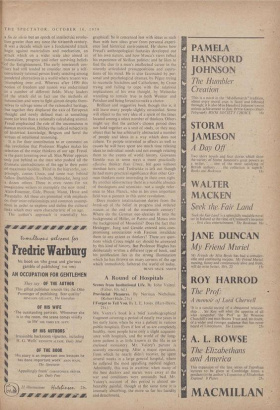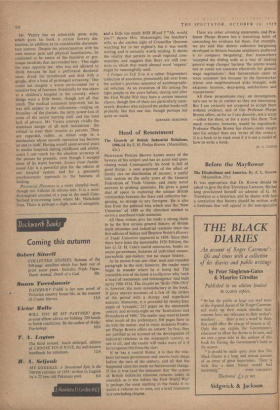A Round of Hospitals
Scenes from Institutional Life. By John Vaizcy. (Faber, 10s. 6d.)
Mit. VnizEv's book i,s a brief autobiogrtiphica .fragment covering a period of nearly two years in his early teens when he was a patient in various public hospitals. Even if few of its are completely healthy, most people have only a slight acquaint- ance with hospitals, and the world of the long- term patient is as little known as the life in an enclosed monastery. Mr. Vaizey's picture is scarcely encouraging. After a major operation. from which he nearly didn't recover, he spent Several weeks in a large general hospital, where he suffered the most appalling medical neglect. Admittedly, this was in wartime, when many of the best doctors and nurses were away at the war and conditions were unusually bad. Mr. Vaizey's account of this period is almost un- bearably painful, though at the same time it is intensely absorbing, the more so for his lucidity and detachment. Mr. Vaizey has an admirable prase style, which gives his book a certain literary dis- tinction, in addition to its considerable documen- tary interest. Despite his preoccupation with his own intense pain and physical humiliations, he continued to be aware of the repulsive or gro- tesque incidents that surrounded him: 'One night the man opposite me, who was not allowed to drink because he had a perforated duodenal ulcer, drank his mouthwash and died with a gurgle, after a bout of prolonged screaming.' One could not imagine a worse environment for a sensitive boy of fourteen. Eventually he was taken to a children's hospital in the country, where things were a little better, though not all that much. The medical treatment improved, but he was still subject to the callousness—verging on brutality—of the doctors, the petty power-lust of some of the senior nursing staff, and the total lack of privacy. Mr. Vaizey conveys vividly the dominant danger of all such institutions: the refusal to treat their inmates as persons. They are regarded, rather, as minor cogs in a mechanism whose smooth operation has become an end in itself. Having myself spent several years in similar hospitals during childhood and adoles- cence I can vouch for the absolute accuracy of the picture he presents, even though I escaped some of its worst horrors. Scenes from Institu- tional Life is a powerful plea for the reform of our hospital system, and for a genuinely psychosomatic approach to the business of healing.
Provincial Pleasures is a more cheerful book, though not without its serious side. It is a semi- fictionalised account of a year in the small Cum- berland iron-mining town where Mr. Nicholson lives. There is perhaps a slight note of smugness, and a little too much Milk Wood (` "Ah, would you'?" shouts Mrs. Makeweight, the butcher's wife, as she catches sight of Councillor Quorum watching her in her nightie'), but it was worth writing and is certainly worth reading. It shows the vitality that persists in small regional com- munities, and suggests that there are still con- texts in which that much abused word 'organic' might be meaningfully used.
Forgot to Tell You is a rather fragmentary collection of anecdotes, presumably left over from the author's previous sequence of autobiographi- cal volumes. As an evocation of life among the right people in the years before, during and after the First World War they have a certain tenuous charm, though few of them are particularly mem- orable. Readers who enjoyed the earlier books will probably like this one too, though perhaps not quite so much.
BERNARD BERGONZI







































 Previous page
Previous page